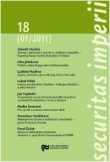Nebezpečný člověk a nežádoucí reakcionář – pater František Štverák
A dangerous person and an undesirable reactionary – the life story of Father František Štverák
Author(s): Stanislava VodičkováSubject(s): Christian Theology and Religion, Military history, Security and defense, Interwar Period (1920 - 1939), WW II and following years (1940 - 1949), Post-War period (1950 - 1989), Fascism, Nazism and WW II
Published by: Ústav pro studium totalitních režimů
Keywords: František Štverák; communism; persecution; Czechoslovakia
Summary/Abstract: This study presents a vivid portrait of a “forgotten” figure in the home-based Czech anti-Nazi resistance – Father František Štverák (1909-1956) from the Prague archdiocese. His five-year odyssey around prisons and concentration camps resembles the fate of many persecuted opponents of the Nazi regime, not just from the ranks of the Catholic Church. The study reveals the method of resistance employed by members of the illegal National Defence (Obrana Národa) military organisation, which began to be formed around generals and higher-ranking officers of the former Czechoslovak Army imme diately after the Nazi occupation of Bohemia and Moravia. Štverák also participated in this group’s diversionary operations. After Štverák’s arrest, we are able to observe the brutal interrogation practices of the Gestapo, the work of the Nazi state judiciary, everyday life in Gestapo prisons as well as in the Dachau and Sachsenhausen concentration camps as part of a punitively disciplined group (which Štverák incredibly managed to survive for two years with some short interludes). Using the fate of other imprisoned priests in the disciplined group (Štvěrák’s fellow prisoners in “protective custody”) as an example, we can look at the typical way in which the Nazis treated the Catholic clergy, particularly German, Czech and Polish Catholic priests. The study continues with Štverák’s life after the end of the war. By doing this, we can look at the renewal of the Prague archdiocese in the post-war period. Of equal interest is a description of the trial by a military tribunal at the Dachau concentration camp in the autumn of 1945, which Štverák had been invited to by American investigators as a witness to testify on the Nazis’ treatment of prisoners in punitively disciplined groups in the concentration camps at Dachau and Sachsenhausen. The short period when a pre-totalitarian regime was in existence came to an end with the establishment of a communist dictatorship. At this juncture, the study focuses on the persecution of Štverák after the communist putsch in February 1948 and his imprisonment for five years, which contributed significantly to his premature demise. The interrogation methods employed by State Security (StB) officers, the show trial prepared by the communist state judiciary and the unlawful incarceration of Štverák at the Želiv internment camp strongly evoke the methods used by the Nazi regime to deal with inconvenient people from the ranks of the Catholic Church. In its wider context, this study contributes to research on the persecution of the Catholic Church, both during the Nazi occupation and subsequently under the communist regime.
Journal: Securitas imperii
- Issue Year: 2011
- Issue No: 18
- Page Range: 226-258
- Page Count: 33
- Language: Czech

